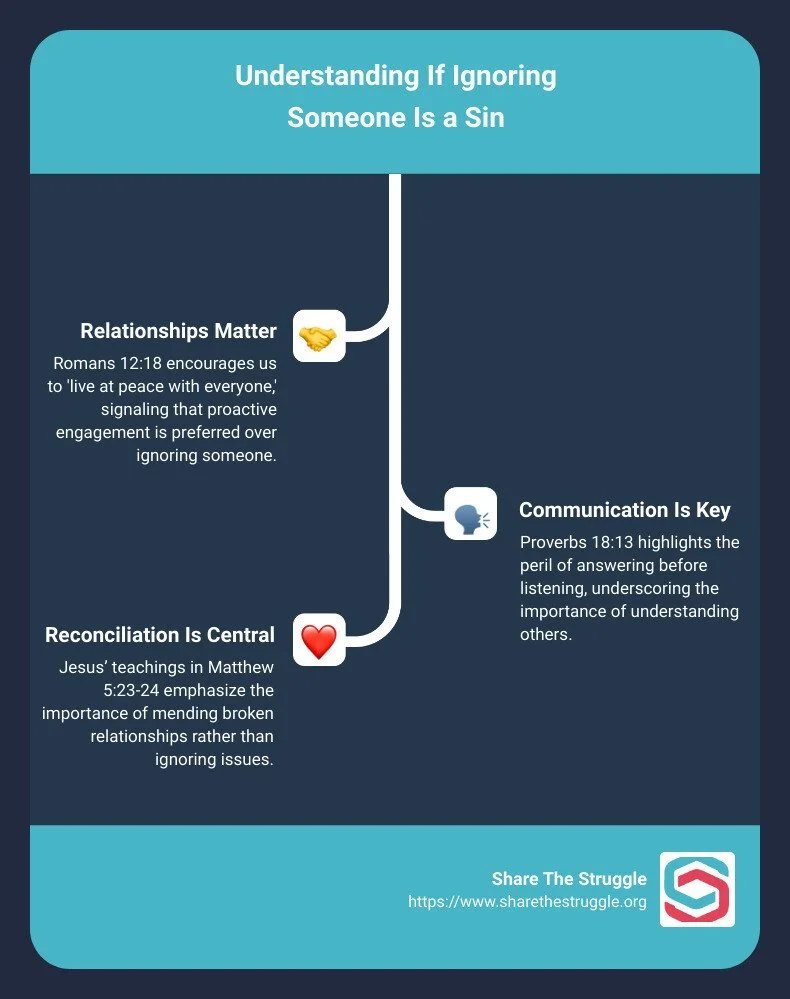The Complete Guide to Understanding If Ignoring Someone Is a Sin
Understanding If Ignoring Someone Is a Sin
Is ignoring someone a sin? The Bible offers nuanced insights into this question, guiding us through its teachings on relationships, communication, and conflict resolution.
Relationships Matter: Romans 12:18 encourages us to "live at peace with everyone," signaling that proactive engagement is preferred over ignoring someone.
Communication Is Key: Proverbs 18:13 highlights the peril of answering before listening, underscoring the importance of understanding others.
Reconciliation Is Central: Jesus’ teachings in Matthew 5:23-24 emphasize the importance of mending broken relationships rather than ignoring issues.
Ignoring someone often stems from complex emotions like anger, hurt, or discomfort. The Bible encourages us to engage with these feelings openly, using them as a pathway to reconciliation and deeper understanding.
I'm Richard Mattingley, an expert in mental health and relationship dynamics. With over five years of experience, I specialize in scripture-based conflict resolution. Let's dig deeper into what the Bible says about ignoring someone and how we can steer this issue faithfully.
What Does the Bible Say About Ignoring Someone?
The Bible offers profound guidance on how we should treat others, emphasizing engagement and reconciliation rather than ignoring. Let’s explore some key scriptures that shed light on this topic.
James 4:17
James 4:17 states, "If anyone, then, knows the good they ought to do and doesn’t do it, it is sin for them." This verse highlights that ignoring someone, especially when we know we should act kindly or helpfully, can be considered sinful. When we choose to ignore someone in need, we are failing to do the good that God expects from us.
1 Corinthians 5:11
1 Corinthians 5:11 advises, "But now I am writing to you that you must not associate with anyone who claims to be a brother or sister but is sexually immoral or greedy, an idolater or slanderer, a drunkard or swindler. Do not even eat with such people." This passage is often misunderstood. It doesn't advocate for ignoring people out of spite or anger but rather sets boundaries for maintaining moral integrity within the Christian community. It underscores the importance of discernment in our interactions.
Romans 12:18
Romans 12:18 encourages, "If it is possible, as far as it depends on you, live at peace with everyone." This verse advocates for proactive communication and reconciliation. Ignoring someone often leads to unresolved conflicts and broken relationships. Instead, the Bible urges us to seek peace and understanding, doing our part to mend and maintain healthy relationships.
Proverbs 14:31
Proverbs 14:31 says, "Whoever oppresses the poor shows contempt for their Maker, but whoever is kind to the needy honors God." Ignoring those in need is seen as a direct offense to God. This verse reminds us that our actions towards others reflect our relationship with God. Being kind and attentive to others, especially those in need, honors Him.
Real-Life Application
Consider the story of Seamus, an attorney who felt excluded at work after a significant loss. Understanding that exclusion can be both accidental and deliberate, he chose to approach the conflict directly, moving beyond the disagreement. This mirrors the biblical call to engage rather than ignore, aiming for reconciliation and peace.
Coaching Support
Navigating strained relationships can be challenging. At Share The Struggle, we offer coaching support to help you apply these biblical principles in your daily life. Our faith-based approach can guide you towards emotional and mental health, ensuring you handle conflicts with grace and understanding.
Next, we will explore the motivations behind ignoring someone and when it becomes a sin.
The Heart Behind Ignoring: When Is It a Sin?
Is ignoring someone a sin? The answer depends on the motivations behind your actions. The Bible emphasizes that the heart's intentions are crucial.
Motivations Matter
Ignoring someone isn't inherently sinful. However, the motivation behind the act can make it sinful. If you ignore someone out of hate or an unforgiving heart, it becomes a sin. The Bible teaches us to act out of love and compassion.
Hate and Unforgiveness
Ignoring someone because of hate contradicts the Bible's teachings. 1 John 4:20 says, "Whoever claims to love God yet hates a brother or sister is a liar." Holding onto hate or resentment is harmful. Matthew 6:14-15 reminds us, "For if you forgive other people when they sin against you, your heavenly Father will also forgive you." Unforgiveness creates a barrier between us and God.
Love and Compassion
On the flip side, ignoring someone to avoid unfruitful interactions might be justifiable. Galatians 5:13 encourages us to, "serve one another humbly in love." If engaging with someone is harmful to both parties, taking a step back can be wise.
Colossians 3:12-14 advises us to clothe ourselves with compassion, kindness, and patience. We should strive to forgive and love one another, binding everything together in perfect unity.
Practical Examples
Jesus' interaction with Jairus (Mark 5:21-43) illustrates the importance of faith over negative influences. Ignoring faith-destroying words helped Jairus witness a miracle. Similarly, Proverbs 18:21 teaches that the tongue holds the power of life and death. We must be mindful of our words and actions.
Coaching Support
Understanding the heart behind your actions can be complex. At Share The Struggle, our coaches are here to help you steer these challenges. They can guide you in applying biblical principles to your relationships, ensuring your motivations align with love and forgiveness.
Next, we will dig into biblical examples and teachings on ignoring others.
Biblical Examples and Teachings on Ignoring
Jesus and Jairus
One powerful story about ignoring others can be found in Mark 5:21-43. This passage tells the story of Jairus, a synagogue ruler, who asked Jesus to heal his dying daughter. As they were on their way, some friends of Jairus came and told him that his daughter was already dead, so there was no need to bother Jesus anymore.
Jesus chose to ignore these faith-destroying words. Instead, He told Jairus, "Don't be afraid; just believe" (Mark 5:36). Jesus knew what He intended to do and the power of God within Him. By ignoring the negative report, He focused on the miracle He was about to perform.
This story shows that sometimes, ignoring words of doubt and negativity is essential to keep our faith strong. Jairus chose to believe Jesus, even when it seemed foolish to others. This act of faith led to the miraculous healing of his daughter.
Faith-Destroying Words
Proverbs 18:21 reminds us that "the tongue has the power of life and death." Words can either build up or tear down our faith. In the story of Jairus, the friends' words were filled with hopelessness, urging Jairus to give up. But Jesus' words were filled with life and hope.
When we encounter negative words, we should ask ourselves if they are faith-destroying. If they are, it may be wise to ignore them, just as Jesus did. Instead, we should focus on words that build faith and encourage us to trust in God's power.
Coaching Support
Navigating the complexities of relationships and faith can be challenging. At Share The Struggle, our coaches are here to support you. They can help you apply biblical principles to your life, ensuring you stay focused on faith-building actions and words.
Next, we will explore the consequences of ignoring others in our lives.
The Consequences of Ignoring Others
Ignoring someone can have serious consequences. It often leads to loneliness and the feeling of being unwanted. These emotions can deeply hurt those who experience them, making them feel invisible and devalued.
Feeling Unwanted and Demeaning
When someone ignores you, it sends a message that you don't matter. This can be incredibly demeaning. It strikes at our core need to feel valued and appreciated. Psalm 139 reminds us that we are wonderfully made and constantly on God's mind. Ignoring someone dismisses this divine truth and can make them feel less than human.
Biblical Insights
In Matthew 25:40, Jesus says, "Whatever you did for one of the least of these brothers and sisters of mine, you did for me." This verse underscores the importance of acknowledging and caring for others. Ignoring someone, especially in their time of need, is contrary to the love God calls us to show. It’s not just a social faux pas; it’s a spiritual failing.
Real-Life Examples
Workplace Exclusion: Imagine working in an office where a co-worker chats with everyone but you. This exclusion can lead to disengagement and even depression.
Social Media Snubs: Sending a friend request on Facebook and getting no response can feel like a slap in the face. It’s a digital form of being ignored that can hurt just as much as in-person rejection.
The Bigger Picture
Ignoring someone doesn't just affect the person being ignored. It also affects the one doing the ignoring. Proverbs 28:27 warns, "Those who close their eyes to the poor receive many curses." Ignoring others can bring negative consequences upon ourselves, both spiritually and emotionally.
Coaching Support
Feeling ignored? Struggling with strained relationships? Our coaches at Share The Struggle can help you apply biblical principles to heal and restore your relationships. Connect with a coach today and find the support you need to steer these challenges.
How to Approach Strained Relationships Biblically
When relationships get strained, the Bible offers clear guidance on how to handle them with grace and wisdom. Let's dive into some key principles.
Reconciliation
Reconciliation is the process of restoring broken relationships. The Bible encourages us to take the first step towards reconciliation, even if it's difficult.
Matthew 18:15 says, “If your brother or sister sins, go and point out their fault, just between the two of you. If they listen to you, you have won them over.” This verse highlights the importance of addressing conflicts directly and privately. It’s about having honest conversations to mend the rift.
Forgiveness
Forgiveness is a crucial part of healing strained relationships. Holding onto grudges only deepens the divide. The Bible is rich with teachings on the power of forgiveness.
Ephesians 4:32 advises, “Be kind and compassionate to one another, forgiving each other, just as in Christ God forgave you.” This reminds us to extend the same grace to others that God extends to us.
Colossians 3:13 reinforces this idea: “Bear with each other and forgive one another if any of you has a grievance against someone. Forgive as the Lord forgave you.” Forgiveness is not a one-time act but an ongoing practice that reflects God’s love.
Practical Steps
Here are some practical steps to approach strained relationships biblically:
Initiate the Conversation: Don’t wait for the other person to come to you. Take the first step, as suggested in Matthew 18:15.
Listen Actively: Be quick to listen and slow to speak. Understanding the other person’s perspective is key to reconciliation.
Seek Forgiveness: If you’ve wronged someone, apologize sincerely. If someone seeks your forgiveness, offer it freely.
Pray for Guidance: Ask God for wisdom and strength to handle the situation with love and grace.
Involve a Mediator: If direct conversation doesn’t work, consider involving a neutral third party, like a pastor or a Christian coach.
Coaching Support
Navigating strained relationships can be tough. Our coaches at Share The Struggle can help you apply these biblical principles in your life. Connect with a coach today and find the support you need to foster reconciliation and forgiveness.
Frequently Asked Questions about Ignoring Someone
What does the Bible say about ignoring sin?
The Bible doesn't mince words when it comes to ignoring sin. In Mark 9:43, Jesus makes a radical statement: "If your hand causes you to stumble, cut it off." This verse emphasizes the serious consequences of letting sin go unchecked. Ignoring sin isn't just about overlooking wrongdoings; it's about allowing harmful behaviors to persist, which can lead to spiritual decay.
Ignoring sin can have severe consequences. It can damage relationships, erode trust, and ultimately lead to a separation from God. The Bible encourages us to confront sin head-on, with wisdom and love, to bring about healing and restoration.
Is ignorance a sin in the Bible?
The Bible offers a nuanced view on ignorance. On one hand, ignorance can be seen as a lack of knowledge or awareness, which isn't inherently sinful. However, James 4:17 states, "If anyone, then, knows the good they ought to do and doesn't do it, it is sin for them." This suggests that willful ignorance—choosing not to know or act on what’s right—can indeed be sinful.
Theologically, the Bible balances grace and knowledge. While ignorance might be overlooked due to grace, deliberate ignorance or neglect of divine teachings is viewed as sinful. This perspective underscores the importance of seeking knowledge and understanding God's will.
What does God say about avoiding people?
The Bible provides guidance on avoiding people under certain circumstances. In 1 Corinthians 5:11, Paul advises, "But now I am writing to you that you must not associate with anyone who claims to be a brother or sister but is sexually immoral or greedy, an idolater or slanderer, a drunkard or swindler. Do not even eat with such people." This verse highlights the importance of moral boundaries for the health of the community.
Avoiding someone isn't inherently sinful; it depends on the motivation and context. If the purpose is to maintain community health and uphold moral standards, it can be justified. However, if avoidance stems from hate or an unforgiving heart, it contradicts biblical teachings on love and reconciliation.
Coaching Support
Understanding these biblical principles can be complex. At Share The Struggle, our coaches are here to help you steer these challenges. Connect with a coach today to gain insights and support in applying these teachings to your life.
Conclusion
Navigating the biblical teachings on ignoring someone can be challenging. The Bible emphasizes love, reconciliation, and the importance of community health. However, it also warns against letting hate or an unforgiving heart dictate our actions.
At Share The Struggle, we believe that everyone deserves support and guidance in understanding and applying these principles. Our faith-based approach integrates scriptural wisdom with emotional and mental health support.
We use the captive thoughts coaching model, which focuses on taking every thought captive to obey Christ, as highlighted in 2 Corinthians 10:5. This model helps identify and reorient thought patterns that keep us trapped in negative cycles, aligning them with the truth of God's Word.
Coaching support can be instrumental in this journey. Our trained Christian coaches are equipped to help you address complex relational dynamics and personal struggles. Whether you're dealing with feelings of loneliness, conflict, or any other challenge, our coaches are here to offer compassionate and practical guidance.
No one has to face their struggles alone. By leaning on your faith and seeking professional help, you can find hope and resilience. Connect with a coach at Share The Struggle to start your journey toward healing and change today.
Remember, God is always with you, and His love is unwavering. Let's walk this path together, guided by His grace and wisdom.



